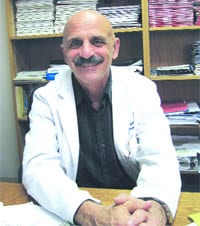Sorting Through The Information Overload The Key Is Finding Sources That Are Credible, Trustworthy, And Understandable
The amount of health information available to the public today is staggering. From news reports to advertising to the Internet, it’s a steady supply of facts, reports, test results, recommendations, and opinions.
Almost every day, news outlets report on some aspect of health care. Whether it’s the flu and vaccines, a prescription drug suddenly being withdrawn, or research on a potential cure for a disease, the flow of information is constant. Adding to the volume is ever-present direct-to-consumer advertising and ‘infomercials’ — about diets, drugs, supplements, and health and fitness products.
And the Internet? Here’s where you’ll find real information overload. Go to Google and type in ‘health information.’ You’ll get 11.7 million results! Try ‘heart disease,’ and you’ll get 10.7 million results.
How does a patient sort through all of this?
As a physician, I always seek the most reliable information. So here’s the key: be discerning about the sources of your information. Your goal should be to find sources that are credible, trustworthy, easily understandable, and offer useful facts appropriate for your personal situation. In essence, know where the information comes from, who is providing it, and what it may mean for you and your family.
Thus, your first source should be your physician. He or she knows your personal health status, your diagnoses, your medications, and your family history. Your doctor should be your best source for health care advice.
But patients should be responsible partners with their physicians, so gathering information is appropriate and may be beneficial, because you ultimately decide your care. With few exceptions (the common cold, minor cuts), just remember not to diagnose or treat yourself. Leave those tasks to your physician.
When seeking and evaluating health information, consider these sources:
• News Stories: News organizations have become more sophisticated in their reporting, but health topics can be complicated issues. News stories, because of time and space constraints of the media, may not have all the details, context, or perspective you might need. For example, medical research and clinical trials of drugs are long-term, complex activities, and while their findings help to establish health care guidelines, it’s difficult to make decisions based on one report. News reports should spur you to seek more data if you think you’re affected.
• Advertising: Advertising by drug and health care companies has grown dramatically in recent years, and making patients aware of approved new drugs, treatments, and health products is certainly worthwhile. But such advertising is usually general in nature, has content controlled by the manufacturer, does not convey all the information you may need (like side effects, interactions with other prescriptions, other cautions or treatment options), and aims to create a demand for a product that will result in more sales. Sometimes, commercials may overstate the benefits of a product.
• Internet: The amount of health information offered on the Internet is seemingly unlimited. But use caution here, too.
Differentiate between commercial, nonprofit, governmental, and educational Web sites. Drug company Web sites, for example, are useful in gaining information on a particular drug or condition, but the site may also contain advertising, sales, and marketing information.
Start any search with governmental and educational Web sites. MedlinePlus® (medlineplus.gov) is comprehensive, with an encyclopedia, dictionary, news, and directories. For public health information, the World Health Organization (who.int/en/), US Centers for Disease Control (cdc.gov), and our State Department of Public Health (mass.gov.dph) offer a wealth of information on topics like infectious disease, injury, environmental and travelers health, and violence. Educational sites, like the Harvard School of Public Health (try its ‘Nutrition Source’ at hsph.harvard.edu/nutritionsource/), also warrant visits.
For the more studious, the National Library of Medicine of the National Institute of Health (www.nlm.nih.gov/) presents history, online exhibitions and digital projects, and the New England Journal of Medicine (nejm.org), among many clinical journals, publishes peer-reviewed information highly regarded throughout the medical community.
More than 100 physician specialty Web sites, many with patient sections, are available through the American Medical Association’s For Patients section at ama-assn.org. Among those worth a look: The American Academy of Family Physicians (familydoctor.org) and the American Academy of Pediatrics (aap.org).
Nonprofit organizations, like the American Heart Association (Americanheart.org) and American Diabetes Association (diabetes.org), are also sound destinations, generally free of commercial influence, as is The Nemours Foundation’s kidshealth.org, with individual segments for parents, children, and teenagers.
Some final thoughts: Many Web sites offer information in second languages and free E-mail newsletters (a great way to keep up-to-date). Verify the age of the information (medical knowledge can change quickly), use more than one source to gather information, and remember to always check with your physician about what’s best for you. This kind of approach should not only keep you well, but also well informed.
Alan C. Woodward, M.D. is Chief of Emergency Services at Emerson Hospital in Concord and President of the Massachusetts Medical Society, the statewide association of physicians. Its Web site at massmed.org offers public health information and links to a variety of health care sites.


Comments are closed.